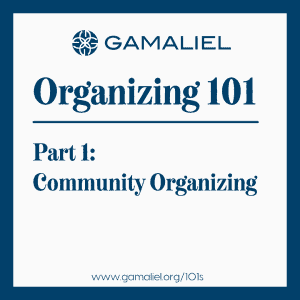
In the first part of our Organizing 101 series, we’ll dive into community organizing itself. What is community organizing, anyway? What does a career in organizing look like? How has the organizing profession changed over time? We’ll get to these questions and more in a series of interviews with senior organizers from the National Staff and throughout the Network.
Organizing and Faith-based organizing, defined
Building relationships in the public arena that are rooted in shared self-interest is the process by which Gamaliel builds power. Shared self-interest is uncovered through one-on-one conversations. We believe that powerful movements are created when everyone involved not only has a clear understanding of why they are participating, but also has genuine empathy and concern for the self-interest and needs of others in their community.
Traditionally, faith-based community organizing relies on organizing congregations and other faith institutions, in a particular geography, who are acting together out of their moral convictions. As a result, most of our affiliates are made up of congregations and faith institutions. Because, however, our work is rooted in a shared set of values, our affiliates also welcome people with no faith. Our organizing is founded in our shared values of justice, equity, and shared abundance.